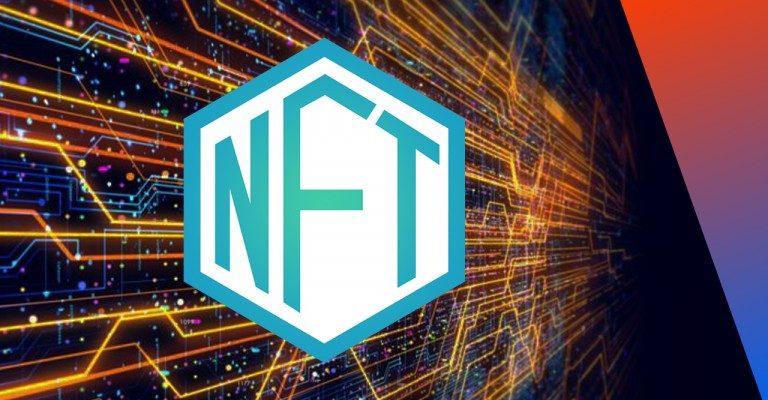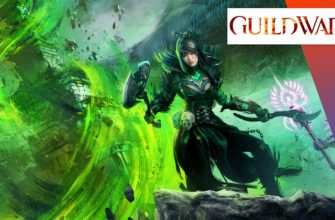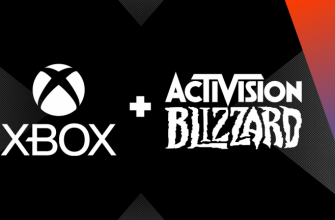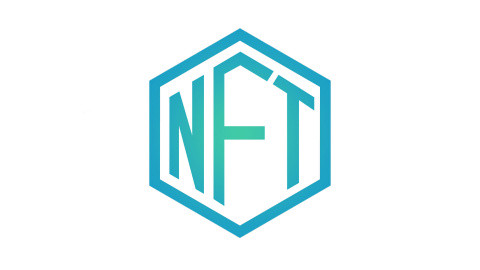
“NFT”, three small letters that have caused a lot of talk in 2024, and more precisely in recent months in the video game sector, when many players in the field have displayed their ambition regarding “non-fungible tokens” ( “Non-fungible tokens” in French). It is a technology that allows you to assign a single sign-on contract to a virtual object, like an image, a video or any file, thus making its owner the official owner of the object in question. A certification made possible thanks to the blockchain, a database that looks like a huge encrypted and decentralized account book, which is updated in real time. NFTs are therefore in theory tamper-proof, and have given rise to impressive digital auctions in 2024. Everydays: the First 5 000 Days, an artistic collage of thousands of digital images, was a few months ago the first non-fungible token sold by Christie’s, an auction house known around the world. Its price: $ 69.3 million, or € 57.8 million.
A craze that has reached the ears of video game companies. “The boom in NFTs has helped blockchain analysts understand that players are interested” Nicolas Pouard, at the head of Ubisoft’s Strategic Innovation Lab, explained to us in a recent article. The man and the famous French publisher recently launched “Quartz”, a platform where it is possible to obtain non-fungible tokens – here called “Digits” – usable in Ubisoft games, currently only compatible with Ghost Recon Breakpoint. Last month, players were able to collect three limited-quantity cosmetic items for free. At the moment, Quartz is in its infancy, but the platform could host in the future “The statistics of the owners of the NFT, their performances, or the sequences of play of which they are proud”, as Baptiste Chardon, another architect of the project, asserts on Le Figaro. The course of the NFTs has been set, while some of Ubisoft’s employees have publicly displayed their disagreement via a trade union organization.
📢 UBISOFT and NFTs
Blockchain is a useless, expensive, ecologically deadly technology that does nothing for video games.https: //t.co/nXPd0i6QYU pic.twitter.com/dCOS7IP3a1
– Solidaires Computing Video Games (@SolInfoJeuVideo) December 14, 2024
They are not the only ones. Overall, the gaming community has been unwelcome to the arrival of non-fungible tokens in consumer games. Recently, the studio GSC Game World had to backpedal on the subject, when it wanted to integrate NFTs in its post-apocalyptic FPS STALKER 2, which is scheduled for release in April 2024. The team’s idea was daring: auction three blank 3D models to then integrate the winners’ faces into the game. A rare opportunity, which would undoubtedly have sold for a high price. It is also the main driving force behind the resale of NFTs: the rarer it is, the more expensive it is.
After the scandal of gambling in mainstream video games, embodied by lootboxes and FIFA Ultimate Team, non-fungible tokens mark a new stage far from pleasing everyone (ethically and ecologically): the addition of a speculation system reminiscent of the stock market or commodity trading blends in with the entertainment. All in different ways. In the case of Quartz, players who managed to land the first exclusive items of Ghost Recon Breakpoint will be able to resell them on external sites, such as Objekt.com. Their limited number grants them a form of rarity that will increase over time. Enough to make a good margin in cryptocurrency, then in real money.
On Quartz, three limited number of NFTs were offered to players free of charge
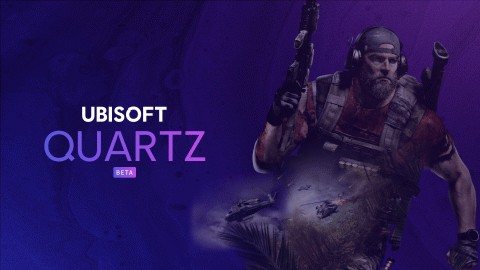
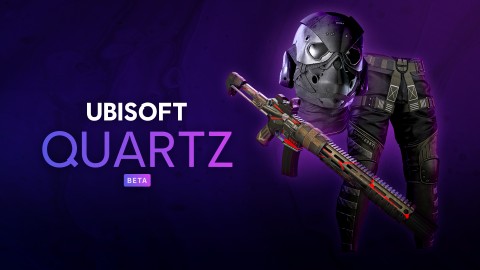
“Our conviction is that the video game must bring a significant return on the investment in time and effort of the players” says Nicolas Pouard from Ubisoft in a tribune published by L’Obs, “Whether through entertainment, knowledge, creativity, socialization or even monetary value”. Quartz Digits deserve. It took 100 hours of play to get military pants. But beyond playing on the scarcity of a digital good, the director of the Strategic Innovation Lab emphasizes interoperability and decentralization. Basically, being able to import an NFT from a game, like a headset, into another virtual world. Today, the rewards won by the players remain “prisoners” of the titles.
“I have spent far too much time playing online games to collect gold. NFTs available on a blockchain can bring new real acquisitions to players ” – Justin Kan, co-founder of Twitch, has just launched “Fractal”, a platform based on NFTs (Source)
But that’s just the tip of the iceberg. Because since 2017 and the launch of the game Crypto Kitties, blockchain pros have started to see the potential of “play to earn” games (“Play to earn money”). A fantasy takes shape. “Every time we put blockchain somewhere, it brings (…) financial democratization. (For video games – editor’s note), it’s absolutely revolutionary ” affirms on his chain YouTube “ZoneBitcoin” Ines Aissa, consultant specializing in the creation of Internet businesses, who popularizes the subject of cryptocurrency online. “Cryptocurrency makes it easy for everyone to get rich, and that’s no exaggeration since anyone can earn a salary, no matter how crazy it sounds”.
As proof, the game Axie Infinity, whose number of players has increased from “20,000 to 2 million in a few months” says Nicolas Pouard from Ubisoft in our columns. It’s a Pokémon-like where non-fungible tokens are playable creatures, called the Axies. Just like pocket monsters, you have to collect, breed and evolve them in order to obtain rare forms but above all to resell them. Before proceeding to the checkout, the characteristics of the animal obviously come into play. But we must not neglect the choice of the sales platform, where the purchase price may vary. According to the American media CNBC, some residents of the Philippines made Axie Infinity their main source of income during the Covid-19 crisis.
Left: Axie Infinity; Right: Legacy
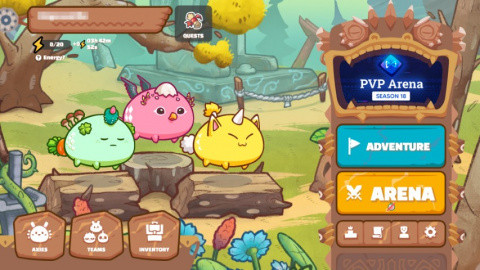
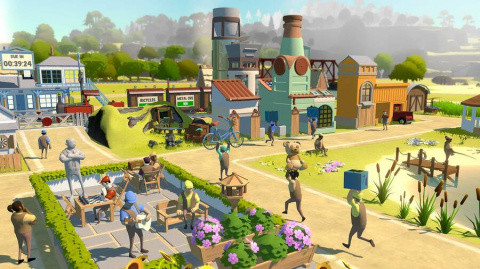
Even though they remain confidential to mainstream video game players, successes like Axie Infinity can be counted in the tens on sites like DappRadar, which communicate in real time the evolution of the number of users and the sums of money passing through them. There are farming, racing or card titles. Lots of opportunities that hide others. More than betting on the potential of a title by reselling NFTs purchased upstream of its success, some games receive millions before their official release. This was recently the case with Legacy, Peter Molyneux’s next project (Fable, Black & White) which should arrive in 2024. The man sold the equivalent of 47 million euros of virtual land in NFTs before the slightest beta.
And we are not at the end of our surprises. As Nicolas Bouard points out again in his forum, the “play to earn” model is already welcoming its very close cousin “create to earn” (“create to earn money”). Concretely, it is a space to encourage the creation of assets – even mods – and their resale in the form of NFTs. It can be in the form of an interface or a 3D world, like Second Life. In short, a sort of metaverse – utopian and digital equivalent of our world – an ideal touted by technology monsters like Facebook, which recently renamed itself as “Meta”.
By searching on the web, we can already see the imminent arrival of proto-metaverse with NFTs. Corn it will take the millions of dollars of the consumer video game industry to give a real dimension to these projects. Yosuke Matsuda, CEO of Square Enix (Final Fantasy), also expressed himself in this direction recently, noting that “The traditional video game offered no explicit incentive” to encourage creatives to continue their contribution in the game. For its part, Electronic Arts has shown interest in non-fungible tokens. Xbox is suspicious. Epic Games, vs. PlayStation and Nintendo still silent.
Written with the help of Alvin Haddadène, journalist and columnist at JV.

